Visit by Ghanaian delegation – a milestone in German-Ghanaian VET cooperation
18.10.2022
BIBB hosted a high-ranking delegation led by Gifty Twum-Ampofo, Deputy Minister of Education of Ghana. This visit signifies and acknowledges the successful cooperation which GOVET supports in Ghana, in a consultative capacity, on behalf of the Federal Ministry of Education and Research (BMBF).
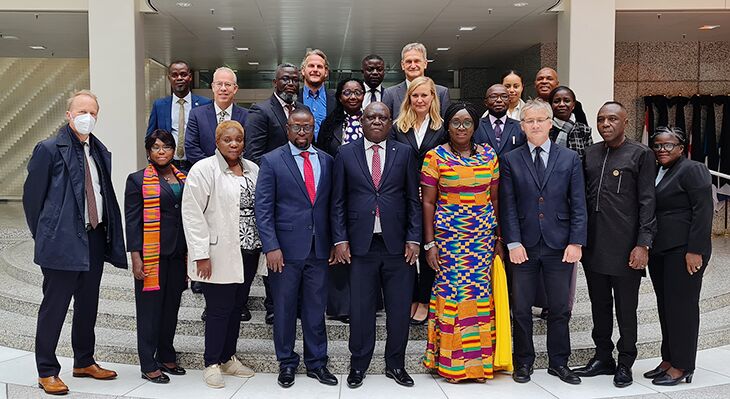
The one-week study visit by the Ghanaian delegation focussed on exploring, the topics of VET reporting, VET research and monitoring, and the dual training system in greater depth. In light of the wide-ranging development processes under way in the Ghanaian vocational education and training system, delegation participants included key representatives from Ghana's leading state TVET institutions. As well as further representatives from the Ministry of Education such as Chief Director Divine Yao Ayidzoe, the exchange also involved two TVET Service representatives, including Director General Mawusi Awitty, as well as a number of Commission for TVET representatives: Board Chair Nana Opoku Wereko-Ampim, Director General Dr. Fred Kyei Asamoah, and other staff. The study tour forms one of the key elements in the bilateral cooperation activities in the vocational education and training between the Ghanaian Ministry for Education and the BMBF, and has been running since 2019.
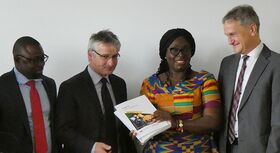
The significance of the visit by the 14-strong delegation was highlighted during the official welcome provided by Ministerial Counsellor Stefan Schneider, head of the department for international VET cooperation and Erasmus+ at the BMBF, and Professor Dr. Hubert Ertl, Vice President and Director of Research of the Federal Institute for Vocational Education and Training (BIBB). The bilateral cooperation in vocational education and training run by the Ministry of Education in Ghana and the BMBF has been in place since 2019 and has made it possible to tie in VET-related aspects with existing projects arising from the development collaboration. The Deputy Minister for Education underlined the importance of the outcomes from the collaboration so far, in particular GOVET's support in creating Ghana's first vocational education and training report. She handed over a copy of the report to Ministerial Counsellor Schneider and Prof. Ertl, and expressed the desire to continue the productive cooperation and expand it into other relevant areas.
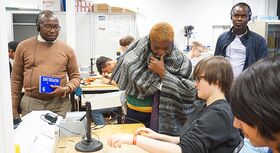
The first appointment on the schedule took the delegation to the recently renovated vocational school, the Carl-Reuther-Berufskolleg in Hennef. Principal Thomas Heußner and staff provided the delegation with a detailed insight into the vocational school's training provision, the coordination of learning locations between school, company and chambers, as well as the methods involved in practical learning. The vocational school was established more than 120 years ago by industrialist Carl Reuther who, even back then, recognised the need for qualified skilled workers in his company and established the school. The visitors from Ghana were also impressed by the school's social to ensuring all students stay on track as they start out in their professions.
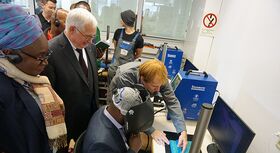
This commitment was also clearly in evidence at the Gemeinschaftslehrwerkstatt (GLW) [Community Learning Workshop] of the Bonn/Rhine-Sieg Chamber of Commerce and Industry (IHK), this time from the perspective of the business and social partners. The GLW was established in 1966 as an inter-company training workshop to support member companies of the Chamber of Commerce and Industry with their training. Many companies send their trainees and employees to the GLW for the first four to six months of training for basic and advanced education and training courses. Jürgen Hindenberg, Director of the Bonn/Rhine-Sieg Chamber of Commerce and Industry and responsible for VET and securing the supply of skilled workers, underlined the importance of the Chambers as competent authorities in the German VET system. He also emphasised that Chambers are run differently in each federal state and that, in each case, individual, national and local solutions needed to be found in terms of how to allocate responsibilities.
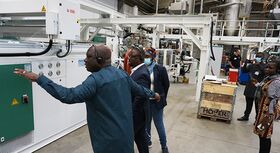
The insight into the dual training system was rounded off with a visit to the Kuhne Group in St. Augustin. Here, having previously seen things from the point of view of a vocational school, inter-company vocational training centre and Chamber, delegation participants now also had the opportunity to experience the perspective of an established training company which has been involved in vocational education and training for 85 years. Managing Director Felix Kuhne presented the main business areas – mechanical engineering of turnkey lines for plastic processing machines and production of films and plastics. On a tour of the factory, and together with trainees and head of commercial and technical training André Eich, the delegation witnessed the practical processes involved in training.
Besides learning about the dual vocational education and training system in practice, the visit also focused on the specific themes of VET research, reporting and monitoring. Experts from BIBB specialist divisions offered insights into their areas of work and projects to provide an understanding of the wide variety of BIBB research activities.
- Heike Gasper, Annett Friedrich and Max Müller-Wegner talked about the coordination of BIBB’s research activities, the development of the topic clusters, the annual research programme as well as the BIBB's Research Data Centre.
- Michael Friedrich spoke about the BIBB Data Report and offered a detailed insight into the preparation of data and statistics.
- Luca Jelic introduced the ASCOT+ project for assessing competency, as well as the pilot projects which had already been developed.
- Dr. Gesa Münchhausen gave a presentation on the current status of integrated continuing vocational education and training reporting (iWBBe) as well as valuable advice on how to use different data sources.
- Kathrin Weis shed some light on the BIBB Training Panel, an annual survey of the initial and continuing VET activities of almost 4000 companies.
- Michael Schwarz shared the experiences gained from the consultation process in Vietnam on the subject of TVET reporting.
- Guido Kirst reported on the various career guidance activities in Germany and on current challenges.
A visit to the German Economic Institute (IW) rounded off the insight into the VET research landscape. Prof. Dr. Hubertus Barth, IW Managing Director, introduced the Institute’s research activities and the BQ Portal – an information and support platform for the recognition of foreign qualifications.
A further highlight was the discussion with German training providers, organised by BIBB division iMOVE – Training made in Germany. In this context, questions often tend to focus on funding. However, in view of the impression they had gained over the course of the week, participants discussed issues covering how to strengthen the integration of business in VET and probed providers for information about support models within the education sector.
In the final workshop, chaired by GOVET, it became evident that delegation participants had been particularly impressed by the involvement of business. When developing a dual system in Ghana it will be a challenge to convince local businesses. For Ghana, consideration must also be given to the roles and responsibilities of the stakeholders involved in both the public and private sector. To date, for example, business associations have had very little involvement in TVET.
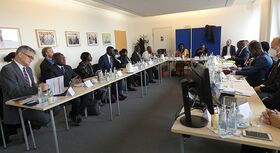
The Ghanaian guests also highlighted the varied research landscape and the numerous methods and approaches to data collection and evaluation introduced to them as exemplary. Clarification was also provided on the funding mechanisms in German VET research: most BIBB research projects are funded by the Federal Ministry of Education and Research (BMBF) or other government departments. The TVET experts from Ghana also regarded the models of cooperation with other research institutes and universities as particularly pioneering ideas.